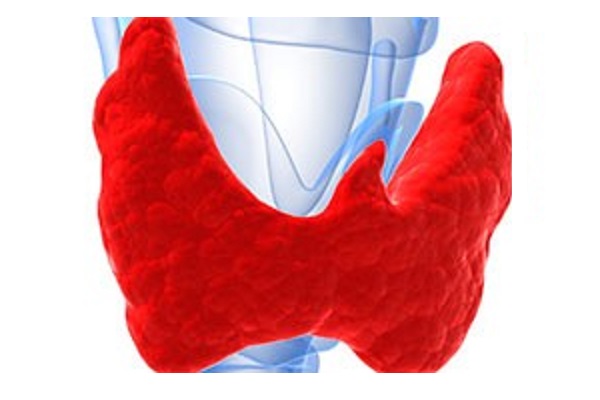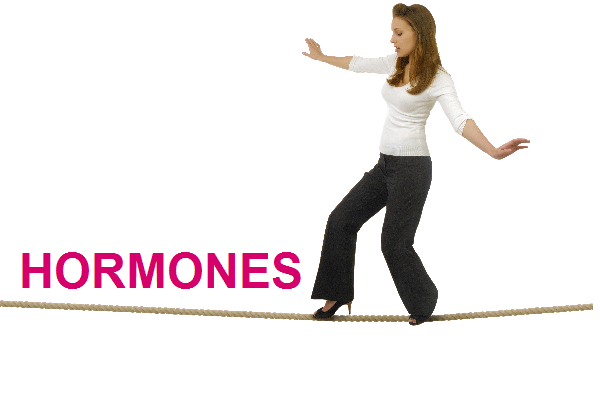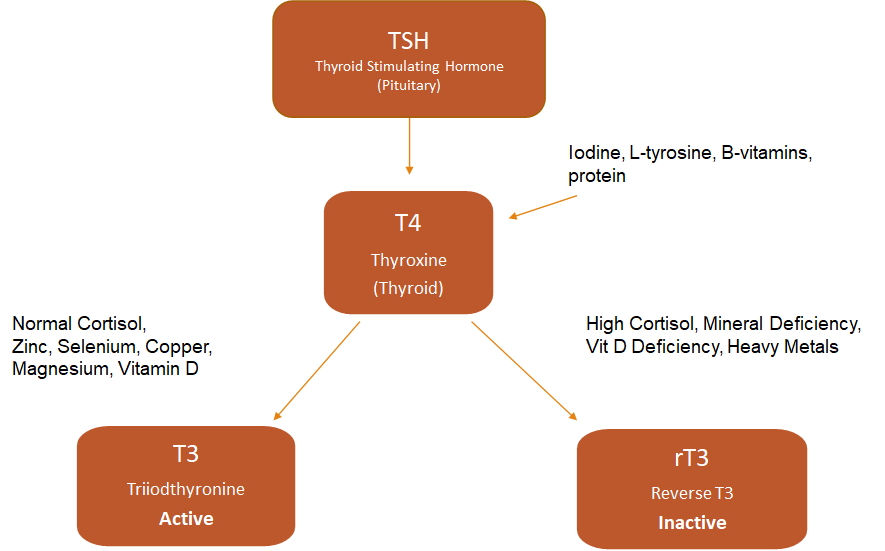
Feeling Awful with a “Normal” TSH?
Your thyroid gland is responsible for a host of bodily functions, every glucose oxidation reaction in the body in fact. Hormones secreted by your thyroid control metabolic rate, body heat, blood pressure, pain response, and directly affect your mood. They govern the metabolism of carbohydrates, proteins and fats, and the secretion of digestive juices. Thyroid hormones also trigger tissue growth, skeletal and nervous system development, reproductive maturation, and reproduction.
The thyroid hormones effect virtually every cell in your body and when they get out of balance you may have brittle and dry nails, dry skin and hair, thinning hair, feel tired even when you sleep 7-8 hours, feel bloated, have weight gain, intolerance to cold, have pain, anxiety or depression or a host of other issues making it hard for you to feel young and vibrant.

TSH testing
If your doctor has suspected a thyroid imbalance, they have likely ordered a TSH test. Thyroid-Stimulating Hormone (TSH), or thyrotropin, is a hormone that stimulates the development and secretions of the thyroid gland. It’s released from the anterior pituitary and it stimulates the thyroid gland to release thyroid hormones (TH). Basically, your TSH is a hormone secreted by your pituitary to signal the thyroid to do its job (release thyroid hormones). A high TSH can signal that you have low thyroid function.
However, TSH is not an ideal test to get to the root cause of disease or see subtle signs of a problem. For example, your pituitary could be stimulating your thyroid as it is supposed to, and you could still not have enough thyroid hormones getting into your cells and feel symptomatic or awful. TSH needs to be assessed with other endocrine hormones to help you get to your root cause and to uncover issues before you have significant symptoms.
Full thyroid panel
Ok, get ready for some science. Thyroid hormone (TH) is actually two different iodine-containing hormones: Thyroxine (T4) and triiodothyronine (T3), the more cellularly active form.

More than 90% of the TH produced is T4 which is made with the help of thyroid peroxidase enzyme (TPO). T4 then is converted into either T3 (within your liver and digestive tract) or reverse T3 (rT3).
T3 is the active form your cells need to function optimally, while rT3 is the inactive form and can reduce the effectiveness of T3 by competing for absorption at the cellular receptor sites
When in balance, and responding as designed, T4 regulates TSH. Low levels of Thyroxine (T4) trigger the release of TSH and ultimately more T4, as does increased body energy requirements. TSH is inhibited by high levels of T4 and lower body energy requirements.
Other Lifestyle factors
The release and conversion of these hormones is dependent on a few things; nutrition, stress, and other toxicities. In order for the thyroid to release T4 we need to have adequate protein in our diet as well as adequate sources of L-tyrosine, B-vitamins and iodine. For T4 to convert to T3 we need a healthy gut microbiome, and enough zinc, selenium, copper, magnesium and vitamin D, and normal cortisol levels (cortisol is released under stress and inflammation). When cortisol is high (high physical, emotional or mental stresses), you have heavy metals in the body, mineral deficiencies and/or vitamin D deficiencies your body makes the inactive reverse T3 hormone instead.
Imbalance (whether under or over-activity of TSH, inability to make T4, conversion of T4 into rT3 or T3 not getting into the cells) causes noticeable and often problematic metabolic changes. Besides nutrition, toxicities, and stress, other factors such as gluten or other food sensitivities, and genetics can also play a role.
Look at the big picture
Your doctor may suggest a TSH test for looking at your thyroid, but again, that’s not enough. The recommended labs to get a complete enough picture to establish a root cause are:
- TSH
- Free and Total T3
- Free and Total T4
- rT3
- Thyroid peroxidase (TPO) antibodies
- TBG
- 4 or 5-point salivary cortisol
- Vitamin D
- Ferritin (iron stores)
Additionally, you may want to look for total protein, estrogen and progesterone levels, genetic markers and more. You’ll need a health care professional well versed at looking at the entire endocrine system, knowledgeable of optimal levels of the above labs, and experienced enough to know what nutrients are needed to help alleviate the imbalance in question.
More:
TSH is considered “normal” when in the reference range of 0.5-5.5 mclU/ml by most labs. Optimal range however is considered to be 0.1 – 1.5 mclU/ml. As a general rule, TSH levels are low during the day and peak just before sleep and remain high during the night.
T4 and T3 bind to thyroxine-binding globulins (TBG’s) produced in the liver in order to be transported through the blood stream. The typical reference range of TBG is 14-30. Optimal is 12-28.
Some people do better on a glandular formulation that contains T3 and T4 than just a T4 supplement (link Synthroid or Levothyroxine); DIO2 gene testing can help ascertain this need.
Hashimoto’s Thyroiditis is an autoimmune condition where your immune system is attacking your thyroid. This can cause both over and under active thyroid symptoms in some as the thyroid tries to repair itself from the immune system attack. Thyroid antibody tests will help you to understand if you have this autoimmune condition.
Resources:
-
Ultra Thyroid Video https://drhyman.com/ty-thyroid/
-
Is An Underactive Thyroid To Blame For Your Mysterious Symptoms? with Dr. Elizabeth Boham – https://drhyman.com/blog/2020/03/13/podcast-hc1-2/
-
Could it be your thyroid? https://www.ultrawellnesscenter.com/2019/04/10/could-it-be-your-thyroid/
-
Supporting the Thyroid: Food as Medicine – https://www.ultrawellnesscenter.com/2018/03/15/supporting-thyroid-food-medicine/
Bio:
Erin Williams, MSN CN LMP, is the founder of EZBalance.com, a health and wellness company established in 2001. Erin has a bachelor’s degree in Chemistry from Purdue, a master’s degree in Nutrition from Bastyr University, and is currently studying to become a Functional Medicine Practitioner. Erin enjoys sharing her love of natural health and wellness with people through lectures, blogs, and consultations.

